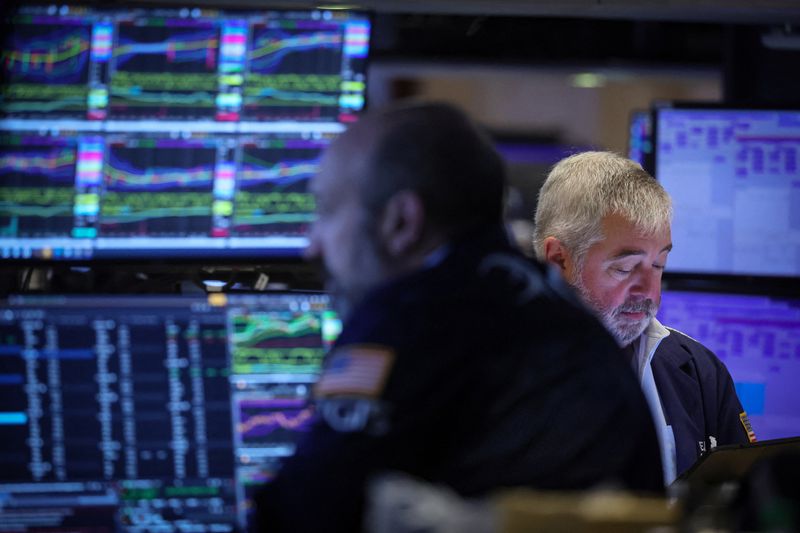By Saqib Iqbal Ahmed
NEW YORK (Reuters) - Options market demand for insurance against a stock market crash has soared to multi-month highs, even as equities have calmed down after a choppy start to the year.
U.S. stock market volatility has subsided as the S&P 500 has logged a 7% year-to-date gain. However, an undercurrent of worries, ranging from a looming showdown over raising the U.S. debt ceiling to Federal Reserve policy, still swirls, pushing some investors to take positions that would pay out if stocks slump.
Three-month skew on the S&P 500 - which measures relative demand of puts versus calls - last week hit its highest level since December 2021. Puts convey the right to sell shares at a fixed price in the future, while calls offer the right to buy shares.
That contrasts with the best-known measure of investor anxiety - the Cboe Volatility Index - which is hovering close to its 18-month lows.
Anand Omprakash, head of derivatives and quantitative strategy at Elevation Securities, said elevated skew suggests investors are pricing a sharp slide in stocks, rather than the type of steady grind lower seen last year, when it fell 19.4%.
"Behind the scenes, option traders are very wary," Omprakash said. (Graphic: Fear factor, https://www.reuters.com/graphics/USA-STOCKS/akveqyedkvr/chart.png)
Demand for crash protection surged in March, as the collapse of Silicon Valley Bank and Signature Bank (OTC:SBNY) roiled the banking sector.
Though stock market gyrations have subsided in recent weeks from levels hit during the regional banks crisis, investors see plenty of catalysts for volatility ahead. These include the prospect of an unprecedented U.S. default that could come within weeks if Congress does not raise the country's $31.4 trillion debt limit.
PAYING FOR PROTECTION
Rising allocations to stocks among investors who cut their exposure to the bone last year is also giving market participants reason to seek protection.
Institutional investors' stock exposure has inched higher after slumping in 2022 to a decade low, excluding the COVID-19 market crash of March 2020, Deutsche Bank (ETR:DBKGn) data showed.
Last year, "you didn't need to be hedged since you were so light on exposure," said Charlie McElligott, Nomura's managing director for cross-asset strategy.
As investors bet the Fed is likely done with hiking interest rate, there has been "a large grab back into exposure over recent months," McElligott said. "Accordingly, now ... you need to hedge for downside again."
Another reason skew measures have moved higher has to do with the recent drop in volatility, with the VIX falling to around 18 from a high of nearly 40 last year.
As volatility falls and markets grind higher, the chance of a sudden, sharp drop increases. That has pushed market participants to shift some tail risk hedges - options positions that guard against the risk of large financial losses from an unforeseen event - toward downside protection, Susquehanna strategist Christopher Jacobson said.
At the same time, with investors more invested in stocks, there is less demand for "fear of missing out" call options, leaving measures like skew tilted in favor of bearish puts, Jacobson said.
SILVER LINING
The market's heightened anxiety may actually bode well for stocks, if history is any indication.
The S&P 500 tends to fare better over the next one-, two-, three- and six-month periods when the three-month skew measure is in the 90th percentile or higher, as it is now, than when the measure is in the middle or bottom of its range, according to a Nomura analysis of data going back to 1997.
One explanation has to do with the mechanics of options hedging. When investors purchase hedges against a drop in stocks, market makers - typically large banks or financial institutions - often manage their own risk by selling stock futures.

If markets rise and the options hedges expire, dealers may be forced to buy back the stock futures they shorted, providing an additional boost to markets.
"Those events where we tend to get "over-hedged" provide the fuel for the melt-up," Nomura's McElligott said.